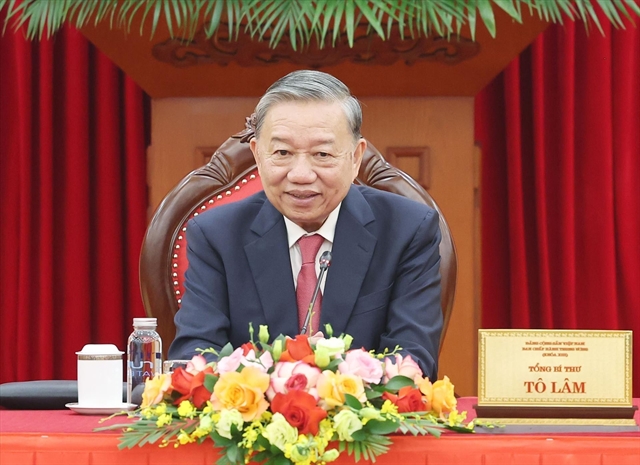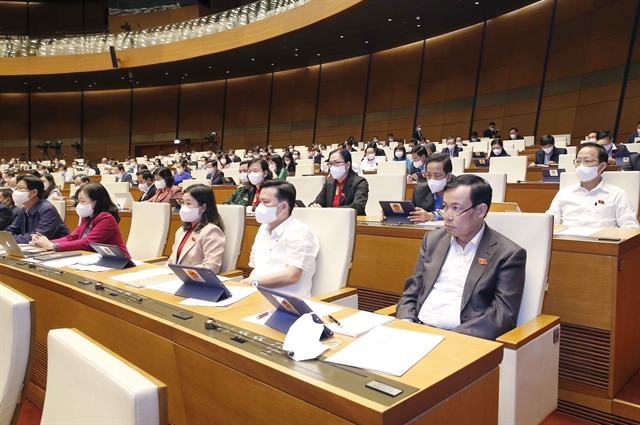 Politics & Law
Politics & Law

National Assembly (NA) deputies on Monday proposed mobilising more sources for preventive medicine, at the same time, stepping up inspection to avoid corruption in purchasing pandemic prevention and control equipment and implementing social security packages.

|
| National Assembly (NA) deputies gathered in Hà Nội this week to convene the second phase of the ongoing 15th NA's second session. — VNA/VNS Photo |
HÀ NỘI — National Assembly (NA) deputies on Monday proposed mobilising more sources for preventive medicine, at the same time, stepping up inspections to avoid corruption in purchasing anti-pandemic equipment and implementing social security packages.
The legislators attended an in-person meeting of the 15th NA in Hà Nội on Monday to weigh in on the implementation of the 2021 socio-economic development plan along with the draft socio-economic development plan for 2022.
They also scrutinised a report on COVID-19 prevention and control.
Deputy Mai Thị Phương Hoa from Nam Định Province praised the NA and the Government for prompt actions taken and documents issued in the fourth COVID-19 wave, highlighting the authorities have listened to people and taken actions for public interests, showing a high sense of responsibility of the NA and the Government.
The treatment strategy has been changed from treatment without layers to treatment with layers, a five-layer treatment to a three-layer treatment, active treatment from a distance. Social distancing has been applied on a large scale then adjusted to a small scale. The Government issued Resolution No 105 to offer assistance to businesses facing difficulties amid the pandemic based on the principle of harmonious benefits, shared risks between the State and enterprises, Hoa said.
“Those examples have demonstrated efficiency of the pandemic prevention and control solutions, some of which were unprecedented. We have taken actions and at the same time drawn lessons.
“The consensus of local people with local authorities have helped a lot of provinces and cities return to normalcy,” she said.
She also pointed out a number of shortcomings including documents required for those passing checkpoints, unfavourable conditions for those living in big cities and industrial zones to return to their hometowns.
Despite the Government’s efforts, local authorities in some areas were inactive in leadership. Some local officials violated the pandemic prevention and control regulations and still played golf during the social distancing period; some were found with dishonest health declarations. Some officers on duty have not kept up with people's needs.
The lessons drawn are to reach a consensus of local people before taking any action. If local people do not understand, local authorities must explain or persuade them, she said.
Hoa proposed six major targets including expanding vaccine coverage, reducing COVID fatality and infection rates, ensuring socio-economic recovery and social security.
Deputy Phạm Văn Thịnh from Bắc Giang Province raised concerns over shortcomings of the grassroots preventive healthcare system in terms of staff and lack of equipment and resources.
Before the fourth wave of the pandemic, there was a limited number of qualified testing centres at the provincial level. Most district-level healthcare centres do not have molecular biology laboratories, leading to the fact that testing is concentrated at provincial/city level, he said.
Sharing the concern, deputy Phạm Khánh Phong Lan from HCM City proposed reviewing the grassroots healthcare system. The allocation of 30 per cent of State budget for preventive and grassroots healthcare must be in relevance with local population size.
The grassroots healthcare system needs not only State investment but also highly-skilled staff to be operated well, she said.
She said: “While we have maximised forces on saving critically-ill patients, private medical facilities are being left behind. If the private medical forces are mobilised in a timely manner, they can make effective contributions.”
Supporting labourers
Trần Văn Khải, a deputy from Nam Định Province, said labourers were the driving force of development because “supporting labourers is stimulating national growth”.
For labourers who have to migrate to look for jobs, the biggest motivation for them is to be able to find a job as good as or better than the old job in a safe area, he said, proposing the Government order local authorities to offer assistance to labourers to encourage them to return to work.
Safe tourism
Deputy Dương Tấn Quân from Bà Rịa - Vũng Tàu Province cited a 97 per cent decrease in the number of foreign tourists to Việt Nam in the first nine months of this year compared to same period last year.
The total collection from tourism activities in the first eight months reached VNĐ136.52 trillion, reducing by 26.5 per cent over the same period last year.
He said to recover tourism which is the sector hit the hardest by COVID-19, it was necessary to improve capacity building for tourism businesses towards sustainable development and give priority to stimulus packages to promote regional linkages.
Deputy Nguyễn Minh Tâm from Quảng Bình Province said a lot of localities had resumed tourism with roadmaps not requiring tourists to be quarantined upon arrival.
She proposed a COVID-19 incident handling process and launch a safety rating scale as a national standard for tourism activities in the post-pandemic era. — VNS